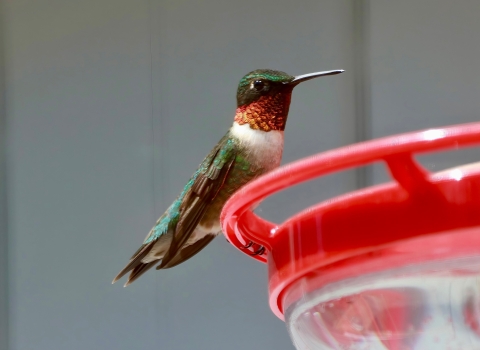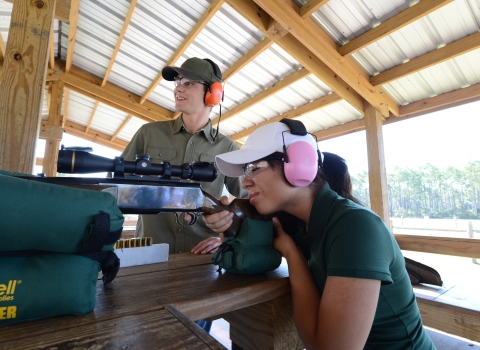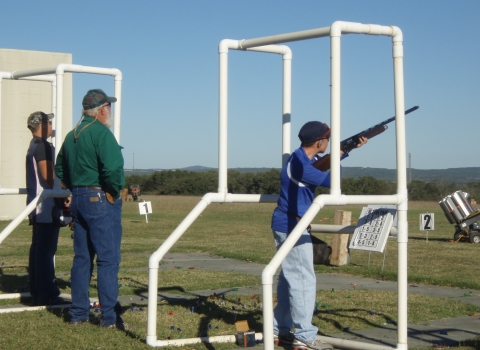This spring, the U.S. Fish and Wildlife Service’s Northeast Regional Fire Program, with support from partner agencies, plan to conduct a series of controlled burns on the Mashpee National Wildlife Refuge (NWR) off of Red Brook and Great Oak Roads in the town of Mashpee and on Falmouth Rod and Gun Club Property off of Carriage Shop Rd. in Falmouth MA to reduce the risk of wildfire to nearby homes and improve fire adapted habitats for a variety of unique or rare plants and animals. The service seeks to burn one to six units in each of these areas that average between 10 and 20 acres each this year.
The primary purposes of this project are to reduce excessive fuel loading to protect people and their homes from wildfires and invigorate shrub growth to enhance woodland and shrubland habitats for rare wildlife species such as the New England Cottontail Rabbit and Northern Long-eared Bats. Burning in a controlled manner under predetermined weather conditions safely reduces litter build up and ladder fuels that could otherwise fuel a wildfire and make it burn more aggressively and harder to control by firefighters.
The prescribed burns will be accomplished by a group of trained wildland fire fighters from the US Fish and Wildlife Service, and several other cooperating agencies. Although controlled burning is planned to occur under a tight set of prescribed conditions which minimize impacts to wildlife and the public, there may be some short periods of time when smoke may impair visibility on public roads that pass through the refuge. Refuge personnel will post warning signs to advise drivers of any hazardous conditions. Visitors driving through the Refuge are strongly encouraged to heed warning signs and slow down when visibility is impaired. Smoke columns produced are expected to be fairly large and visible for several miles. It would be appreciated that if you spot a smoke column and think it may be a wildfire, please call the refuge office at 978-443-4661 or the Mashpee Fire Station at 508-539-1454 to see if there is a burn in progress before notifying other authorities. Residents and visitors in the area may see or smell smoke during the burn.
A reverse 911 message will likely be sent out to all adjacent residences days prior to and the day before the burn notify them. Burning will be done under conditions of a permit from The Massachusetts Department of Environmental Protection, Air Quality Division. For more information on Fire Management on National Wildlife Refuges in the Northeast visit: www.fws.gov/northeast/refuges/fire
The exact date of the burn depends on having the right weather conditions and proper fine fuel moistures. If these burns cannot be executed this spring, they will be rescheduled for later in 2022.
Mashpee NWR is one of more than 560 refuges in the National Wildlife refuge System administered by the U.S. Fish and Wildlife Service. Mashpee NWR was established in 1995 to preserve and protect natural resources associated with the Waquoit Bay area for the protection of waterfowl and wildlife. Located in the towns of Mashpee and Falmouth, this refuge is a partnership refuge that will total 5,871 acres when complete, only a small percentage of which will be owned by the Fish and Wildlife Service. Managed through a unique partnership among nine Federal, State and private conservation groups, this Cape Cod refuge preserves thousands of acres of magnificent pitch pine scrub oak, salt marshes, cranberry bogs, Atlantic white cedar swamps, freshwater marshes, rivers and vernal pools. The U.S. Fish and Wildlife Service along with other partners protects and manages Mashpee NWR for nesting, resting, and feeding habitat for wildlife, with special emphasis on rare, threatened or endangered plants and animals such as the New England Cottontail. The mission of the U.S. Fish and Wildlife Service is working with others to conserve, protect and enhance fish, wildlife, plants and their habitats for the continuing benefit of the American people. We are both a leader and trusted partner in fish and wildlife conservation, known for our scientific excellence, stewardship of lands and natural resources, dedicated professionals and commitment to public service.



